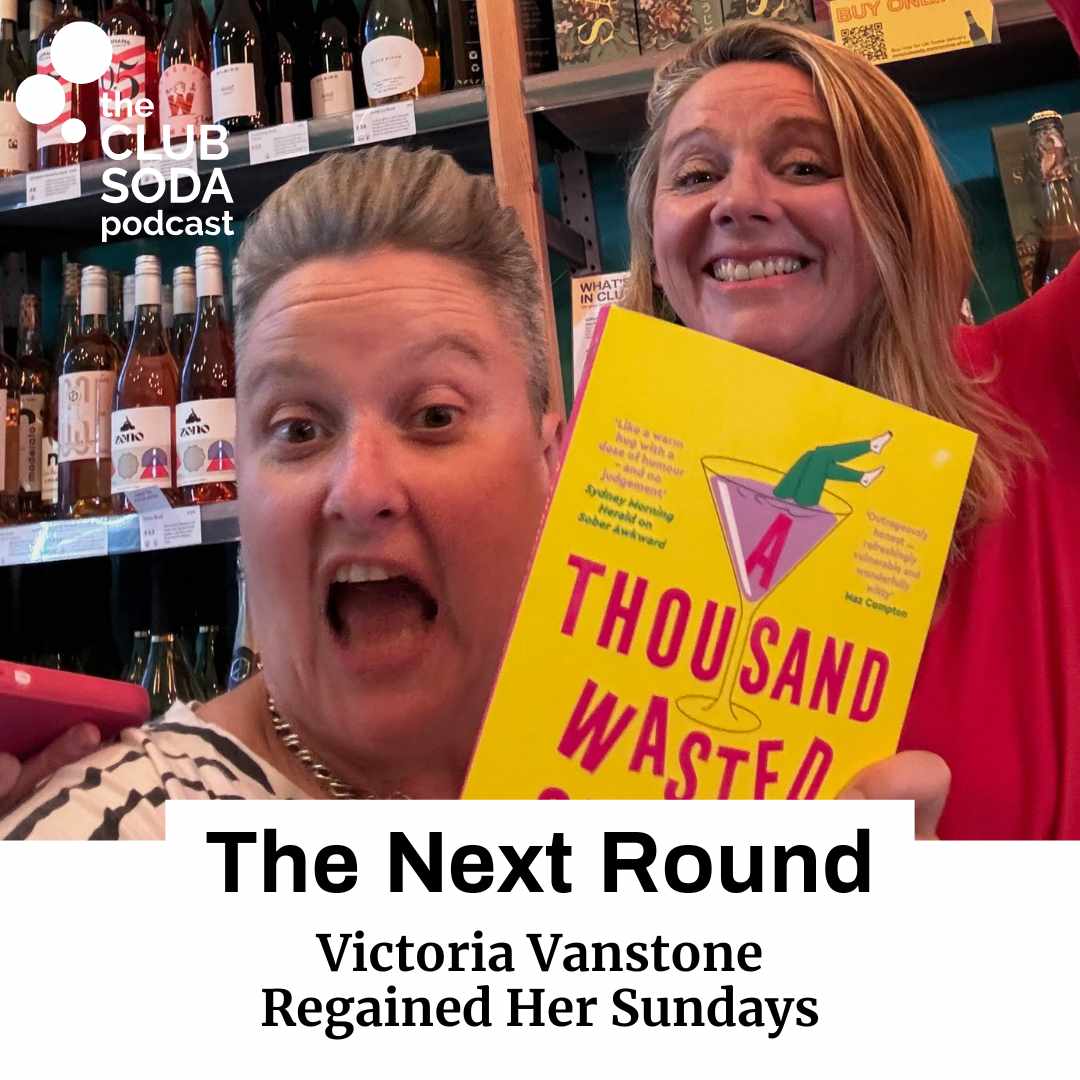
This website uses cookies to improve your experience. We'll assume you're ok with this, but you can opt-out if you wish. Read More
The Next Round: What happens after you change your drinking?

This November we are focusing on issues surrounding men and alcohol. We have invited Marcus Barnes to write a series of articles tackling some of these. Marcus is an author, journalist and copywriter. He has almost two decades of writing experience across a broad range of topics. He’s written three books and has a book on sobriety in the pipeline. In his first piece for Club Soda, Marcus explores becoming a parent, alcohol and fatherhood, and his personal struggles with his mental health after the birth of his first child.
Whether you have children or not, you’ll be aware that becoming a parent is one of the biggest life transitions a person can make. In this shift from adulthood to parenthood we experience numerous stressors, emotions, thoughts and feelings, which lead to a range of psychological reactions. Anxiety and stress are to be expected. But loss of identity, the dramatic change in relationship dynamics and the newfound responsibility of caring for a young life are among the long list of difficulties we can face when becoming a parent for the first time.

Alcohol can become intertwined with this process, and men, who of course, don’t breastfeed or need to observe any post-birth sobriety if they don’t want to, can often turn to drinking in order to cope with the complex spectrum of emotional responses to their new role as a dad. For me, that unsettling collection of emotions resulted in postnatal depression. I count being sober as part of the reason why I managed to recover.
Postnatal depression isn’t just hormonal. It’s about a whole series of factors in each individual’s psychology or history that kick in on top of everything else
Though only clinically defined for women, what some may refer to as postnatal depression in men post-birth has been covered in several studies including an extensive research project by the Medical Research Council. The study gathered data from almost 87,000 families who received medical care between 1993 and 2007 and identified those who had been diagnosed with depression or prescribed antidepressants.
3% of fathers were found to have suffered from depression within their first year of becoming a parent. This figure is believed to be inaccurate as it’s often unrecognised by observers, or suppressed by those suffering with it. Andrew Mayers, a psychologist specialising in perinatal mental health at Bournemouth University, told The Guardian, “Postnatal depression isn’t just hormonal. It’s about a whole series of factors in each individual’s psychology or history that kick in on top of everything else.” This paper, published by the Royal College of Psychiatrists covers the issue in greater detail.
Since many of us men have been conditioned and shamed into suppressing our emotions, we’re not usually bestowed with the most robust coping mechanisms. Boozing is an outlet that is 1) convenient and 2) widely accepted by our society, so it’s usually the first port of call for a lot of guys who need an escape from their mental turmoil.
While men and women experience mental health problems at roughly the same rate, men are less likely to seek help
Research, published by Scottish Health Action on Alcohol Problems (SHAAP) and the Institute of Alcohol Studies (IAS) shows that while men and women experience mental health problems at roughly the same rate, men are less likely to seek help and more likely to hide their symptoms. They are also reported to have fewer emotionally supportive relationships on average. (Both taken from Reviewing the assumptions about men’s mental health: An exploration of the gender binary by Smith, D.T., Mouzon, D.M. and Elliott, M.).
This is especially pertinent in parenting. Men will typically be in a supporting role and feel they need to a) provide, b) be a ‘fixer’ and c) return to work. By adopting this supporter role men immediately extinguish their ability to show vulnerability or weakness. Once back at work, ‘normal’ service resumes and we have the perfect avenue to avoid our feelings, then go to the pub afterwards and suppress them even more.
Recovering from that and processing it all takes a lot of work in itself. That’s before you’ve even got into being a dad
During antenatal meetings and all of the pre-birth settings, the main focus is on the pregnant mother. In labour and birth, again mother and baby are the focal point. Very little attention is given to the man, who will probably be experiencing an unfathomable swirling tornado of emotions. The birth of my daughter was, fortunately, relatively stress-free and I’m very thankful for that. I don’t know what I would have done had I been put in a position where I had to deliver her at home or, worse still, had to endure a health scare of some kind. Even so, it’s an unusual and extreme scenario and one which exerts a lot of mental pressure over a long period of time with very little rest. Recovering from that and processing it all takes a lot of work in itself. That’s before you’ve even got into being a dad.
I recall a story about a dad in the early twentieth Century still being at work when he was called to the hospital for the labour, arriving, wishing his wife well and going to the pub, only returning once his child had been born. Things have changed quite a bit but, even recently, I’ve heard of dads bringing a little flask containing whisky or similar, just to take the edge off the labour. We’re usually out on the lash ‘wetting the baby’s head’ soon after they’ve arrived, too.
I have a vivid memory of how shellshocked he looked, behind the bravado I could sense the feeling of overwhelm he was experiencing
At one such get together for a close friend I have a vivid memory of how shellshocked he looked, behind the bravado I could sense the feeling of overwhelm he was experiencing. This became even more apparent when he revealed that he’d stay up drinking on his own almost every night after work, once the baby and his partner had gone to bed. Though it’s not as overtly enabled as ‘wine mom culture’, which has an entire universe of memes connected to it, I’m sure that instances of men drinking, alone or in groups, to cope with the stress of parenthood are very common.
I can’t imagine how that first year would have been if I was still drinking. To be frank, it was hellish for many of the reasons I mentioned earlier in this piece. Additionally, I work from home so was almost constantly distracted by having my partner and our baby at home too. Our daughter was a terrible sleeper, waking up multiple times every night for almost 11 months. I had postnatal depression and really struggled to find the time and space to work through it. I attended talking therapy through my local authority twice, the second time just a month after lockdown, when my mental health took a severe hit and I ended up wishing I was dead.
Had I been drinking too, who knows if I’d have made it through
Had I been drinking too, who knows if I’d have made it through. As we all know, the after effects of drinking take a serious toll on our mental wellbeing, exacerbating stress and anxiety. Because I was in such a bad way I shudder to think how bad it could have got if I’d been self-medicating with alcohol.
What I’ve learned so far from my baby-sized baptism of fire is that there are a few key things that are essential to maintaining some kind of mental equilibrium when you become a parent, and most of these will be affected by drinking and hangovers:
Drinking to numb our emotions can only have negative consequences in the long run. I’d advise men having difficulty adjusting to life as a parent, or going through a rough patch with their child, to consider reducing their intake or perhaps taking a break altogether. Taking some time out to check in and see what you’re feeling, and sharing that with someone can neutralise any difficult emotions. Try it, you’d be surprised at how much of a difference it makes.
This website uses cookies to improve your experience. We'll assume you're ok with this, but you can opt-out if you wish. Read More
| Name | Domain | Purpose | Expiry | Type |
|---|---|---|---|---|
| wpl_user_preference | joinclubsoda.com | WP GDPR Cookie Consent Preferences. | 1 year | HTTP |
| PHPSESSID | www.tickettailor.com | PHP generic session cookie. | 55 years | HTTP |
| AWSALB | www.tickettailor.com | Amazon Web Services Load Balancer cookie. | 7 days | HTTP |
| YSC | youtube.com | YouTube session cookie. | 55 years | HTTP |
| Name | Domain | Purpose | Expiry | Type |
|---|---|---|---|---|
| VISITOR_INFO1_LIVE | youtube.com | YouTube cookie. | 6 months | HTTP |
| Name | Domain | Purpose | Expiry | Type |
|---|---|---|---|---|
| _ga | joinclubsoda.com | Google Universal Analytics long-time unique user tracking identifier. | 2 years | HTTP |
| sbjs_migrations | joinclubsoda.com | Sourcebuster tracking cookie | 55 years | HTTP |
| sbjs_current_add | joinclubsoda.com | Sourcebuster tracking cookie | 55 years | HTTP |
| sbjs_first_add | joinclubsoda.com | Sourcebuster tracking cookie | 55 years | HTTP |
| sbjs_current | joinclubsoda.com | Sourcebuster tracking cookie | 55 years | HTTP |
| sbjs_first | joinclubsoda.com | Sourcebuster tracking cookie | 55 years | HTTP |
| sbjs_udata | joinclubsoda.com | Sourcebuster tracking cookie | 55 years | HTTP |
| sbjs_session | joinclubsoda.com | SourceBuster Tracking session | Session | HTTP |
| Name | Domain | Purpose | Expiry | Type |
|---|---|---|---|---|
| mailchimp_landing_site | joinclubsoda.com | Mailchimp functional cookie | 28 days | HTTP |
| __cf_bm | tickettailor.com | Generic CloudFlare functional cookie. | Session | HTTP |
| NID | google.com | Google unique id for preferences. | 6 months | HTTP |
| Name | Domain | Purpose | Expiry | Type |
|---|---|---|---|---|
| _ga_10XZMT03ZM | joinclubsoda.com | --- | 2 years | --- |
| AWSALBCORS | www.tickettailor.com | --- | 7 days | --- |
| cf_clearance | tickettailor.com | --- | 1 year | --- |
| VISITOR_PRIVACY_METADATA | youtube.com | --- | 6 months | --- |
Join Club Soda for 10% off your first order of drinks for UK delivery. Plus get our latest news and special offers for members to choose better drinks, change your drinking and connect with others.
If you get an error message with this form, you can also sign up at eepurl.com/dl5hPn